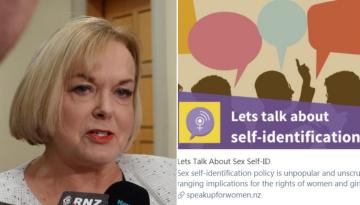
The Otago Daily Times newspaper is being criticised for publishing an advertisement by the controversial feminist group Speak Up For Women.
A photo of the advert, published in the newspaper on Tuesday, was posted to Twitter by a Dunedin resident.
The advertisement shows a dictionary definition for the word 'woman' as "adult human female".
"Say 'no' to sex self-identification," the ad says.
Speak Up for Women has been criticised as anti-transgender - something they reject. The group this year has been holding meetings throughout New Zealand to discuss sex self-identification clauses within the Births, Death, Marriages, and Relationships Registration Bill.
A proposal is due to be before Parliament that would allow people to change the sex, as mentioned on their birth certificate, by statutory declaration.
"The @ODTnews published a quarter-page ad for TERF [trans-exclusionary radical feminist] group Stand Up for Women today," the Twitter user who shared the ad said. "Absolutely despicable."
He sent a complaint to the ODT's owners Allied Press and also shared the company's response.
"Allied Press does not in any way support the views expressed by Speak Up for Women in an advertisement published in the Otago Daily Times and community," the response said. "We take a lot of care around the advertisements we publish. We had some concerns with this campaign and referred it to the Advertising Standards Authority for their comments.
"They had already had complaints from a similar billboard campaign in Wellington by the same advertiser. They concluded the billboard was 'robust advocacy' and there was no case to answer.
"The same advice was given to us regarding the current campaign. We respect the democratic right of free speech."
In total, 34 complaints were made to the Advertising Standards Authority (ASA) about the Speak Up For Women billboard in downtown Wellington that, like the ODT advertisement, said, "Woman - wƱmən - noun - adult human female".
"The complaints board did not uphold complaints about a billboard for Speak Up For Women," the ASA said in its decision released last month. "The majority of the complaints board said in the context of advocacy advertising the advertisement was socially responsible and did not reach the threshold to cause harm, or serious or widespread offence, did not cause fear or distress without justification and was not misleading."
Speak Up For Women defended the ad as part of a campaign to "raise awareness" about the Births, Death, Marriages, and Relationships Registration Bill, the ASA decision said.


